Introducing young children to healthy eating habits and physical activity is crucial for their overall development and well-being.
Therefore, it’s essential to provide preschoolers with engaging and age-appropriate activities that promote health and nutrition education.
We’ll explore twenty effective health and nutrition activities for Preschoolers that encourage learning in various areas such as cognitive, social, emotional, and physical development.
Healthy Snack Making:
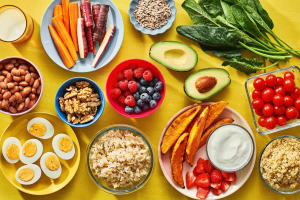
Encourage preschoolers to make their own healthy snacks with ingredients like fruits, vegetables, and whole grains. This activity promotes fine motor skills, introduces children to healthy food options, and helps them feel empowered about making healthy choices.
Related: 20 No Bake Cooking Activities for Preschoolers (With Recipes)
My Plate Matching Game:
Create a MyPlate Matching Game by printing out pictures of different foods and having children match them to the corresponding food group on the MyPlate diagram. This activity promotes cognitive development, improves food identification skills, and introduces the concept of healthy food groups.
Veggie Taste Test:

Set up a taste test station with a variety of different vegetables for preschoolers to try. Encourage them to explore new flavors and textures, and talk about the different health benefits of each vegetable.
This activity promotes social and emotional development, encourages healthy eating habits, and helps children become more adventurous eaters.
Nutrition Scavenger Hunt:
Create a scavenger hunt around the classroom or outside with clues that lead children to different healthy food options. This activity promotes physical development, encourages teamwork and cooperation, and introduces children to new healthy foods.
Exercise Bingo:
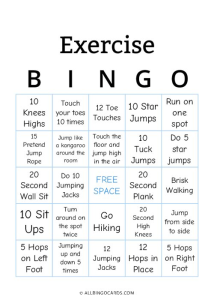
Create a bingo board with different physical activities like jumping jacks, running in place, or hopping on one foot. Have children complete each activity and mark off the corresponding square.
This activity promotes physical development, improves gross motor skills, and introduces the concept of regular exercise.
Food Group Sorting:

Give children a variety of foods and have them sort them into different food groups. This activity promotes cognitive development, improves food identification skills, and introduces the concept of healthy food groups.
Food Collage:
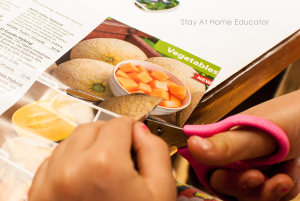
Provide preschoolers with a variety of food magazines and have them cut out healthy food options to create a food collage. This activity promotes fine motor skills, encourages creativity, and introduces children to healthy food options.
Related: 20 Classroom Cooking Ideas for Kindergarten
Cooking Activities:

Encourage preschoolers to help prepare healthy meals and snacks, such as making a fruit salad or assembling a sandwich.
This activity promotes fine motor skills, introduces children to healthy food options, and helps them feel empowered about making healthy choices.
Healthy Eating Story Time:
Read books about healthy eating, such as “The Very Hungry Caterpillar” or “Green Eggs and Ham”. Encourage discussion about healthy eating habits and what makes food healthy.
This activity promotes social and emotional development, introduces children to new vocabulary, and encourages healthy eating habits.
Garden Activities:

Create a classroom or outdoor garden where preschoolers can plant and grow fruits and vegetables. This activity promotes physical development, encourages responsibility and teamwork, and introduces children to the concept of growing their own food.
Related: 20 Quick Interactive Activities for Preschoolers & Toddlers (Age 3 – 5)
Food Texture Exploration:

Provide children with a variety of foods with different textures, such as smooth yogurt, crunchy carrots, or chewy dried fruit. Encourage them to touch, smell, and taste each food while discussing the different textures and why they are important for a balanced diet.
Colorful Food Art:

Provide children with a variety of colorful fruits and vegetables and encourage them to create their own food art by arranging the different items on a plate.
This activity promotes creativity, introduces children to healthy food options, and encourages healthy eating habits.
Mindful Eating:
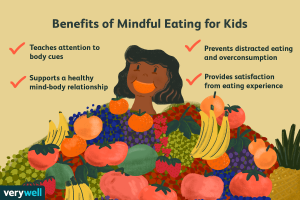
Encourage children to slow down and focus on their senses while eating. Have them describe the colors, smells, and tastes of the food, and discuss how eating slowly and mindfully can help them enjoy their food and prevent overeating.
Cooking Demonstrations:

Invite a chef or nutritionist to visit the classroom and demonstrate how to prepare healthy meals and snacks. This activity promotes social and emotional development, introduces children to new healthy foods, and helps them learn new cooking skills.
Healthy Food Bingo:

Create a bingo board with different healthy food options and have children mark off each square as they try each item. This activity promotes cognitive development, introduces children to new healthy foods, and encourages healthy eating habits.
Food Label Reading:
Provide children with a variety of packaged foods and have them practice reading the nutrition labels to identify healthy options. This activity promotes cognitive development, improves food identification skills, and helps children make informed food choices.
Body Movement Activities:

Encourage children to move their bodies in different ways, such as stretching, dancing, or practicing yoga. This activity promotes physical development, improves gross motor skills, and introduces children to the concept of regular exercise.
Related: Human Body Preschool Activities
Healthy Snack Recipe Swap:
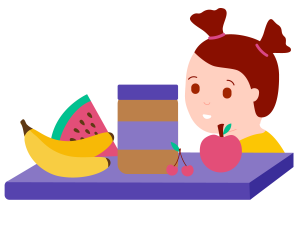
Encourage families to share their favorite healthy snack recipes, and have children choose one recipe to make and share with the class. This activity promotes social and emotional development, introduces children to new healthy foods, and encourages healthy eating habits.
Health and Nutrition Puppet Show:
Use puppets or stuffed animals to act out a story about healthy eating habits, and encourage children to participate in the storytelling. This activity promotes creativity, improves language skills, and introduces children to healthy eating habits.
Mindful Breathing:

Teach children simple breathing exercises they can use to calm their minds and bodies and encourage them to practice mindful breathing before meals and snacks.
This activity promotes emotional development, improves mindfulness skills, and encourages children to listen to their bodies.
Conclusion
In conclusion, incorporating health and nutrition education into the preschool curriculum is crucial to ensure that children develop healthy habits that will last a lifetime.
By incorporating these activities into their daily routine, children will not only gain knowledge and awareness about healthy living, but they will also develop important life skills such as problem-solving, creativity, and decision-making.
Encouraging a healthy lifestyle in preschoolers will not only benefit their physical health but will also promote their social and emotional development.

